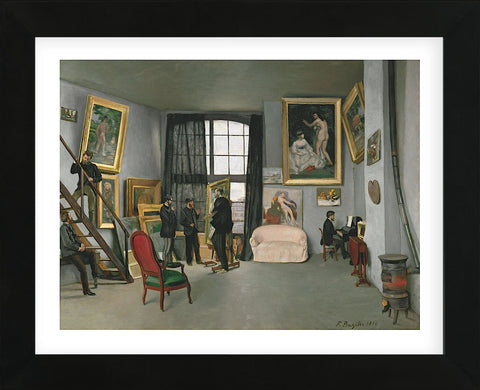Product Detail
- Overall: 16" H x 13" W x 0.75" D
- Overall Product Weight: 2.5lb.
- Material: Glass
- High-quality print on heavy paper
- Printed with vibrant, color-fast inks
- Framed in a contemporary style molding; available in black, gold, and white
- Sawtooth hanger
- Unmatted
© 2025
McGaw Graphics, Inc.
Product Detail
- Overall: 13" H x 16" W x 0.75" D
- Overall Product Weight: 2.5lb.
- Material: Glass
- High quality print on heavy paper
- Printed with vibrant, color-fast inks
- Framed in a contemporary style molding; available in black, white, and gold
- Sawtooth hanger
- Unmatted
About the Artist
Jean Frédéric Bazille (December 6, 1841 – November 28, 1870) was a French Impressionist painter whose major works often foreground the figure within a landscape painted en plein air.
Frédéric Bazille was born in Montpellier, Hérault, Languedoc-Roussillon, France, into a wealthy Protestant family. He became interested in painting after seeing some works of Eugène Delacroix. His family agreed to let him study painting, but only if he also studied medicine.
Bazille began studying medicine in 1859, and moved to Paris in 1862 to continue his studies. There he met Pierre-Auguste Renoir and Alfred Sisley, was drawn to Impressionist painting, and began taking classes in Charles Gleyre's studio. After failing his medical exam in 1864, he began painting full-time. His close friends included Claude Monet, Alfred Sisley, and Édouard Manet. Bazille was generous with his wealth, and helped support his less fortunate associates by giving them space in his studio and materials to use.
Bazille was just twenty-three years old when he painted several of his best known works, including The Pink Dress (ca. 1864, Musée d'Orsay, Paris). This painting combines a portrait-like depiction of Bazille's cousin, Thérèse des Hours, who is seen from behind—and the sunlit landscape at which she gazes. His best known painting is Family Reunion of 1867–1868 (Musée d'Orsay, Paris).
Frédéric Bazille joined a Zouave regiment in August 1870, a month after the outbreak of the Franco-Prussian War. On November 28 of that year he was with his unit at the Battle of Beaune-la-Rolande when, his officer having been injured, he took command and led an assault on the German position. He was hit twice in the failed attack and died on the battlefield at the age of twenty eight. His father travelled to the battlefield a few days later to take his body back for burial at Montpellier over a week later.





